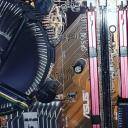Is there NAS software/hardware that allows different size drives?
-
Featured Topics
-
Topics
-
9
-
1
-
2
-
2
-
9
-
CDR_Xavier ·
Posted in Build Logs1 -
McBeth1087 ·
Posted in New Builds and Planning11 -
9
-
NamelessUser ·
Posted in Troubleshooting2 -
HereWeGo ·
Posted in Power Supplies3
-

















Create an account or sign in to comment
You need to be a member in order to leave a comment
Create an account
Sign up for a new account in our community. It's easy!
Register a new accountSign in
Already have an account? Sign in here.
Sign In Now